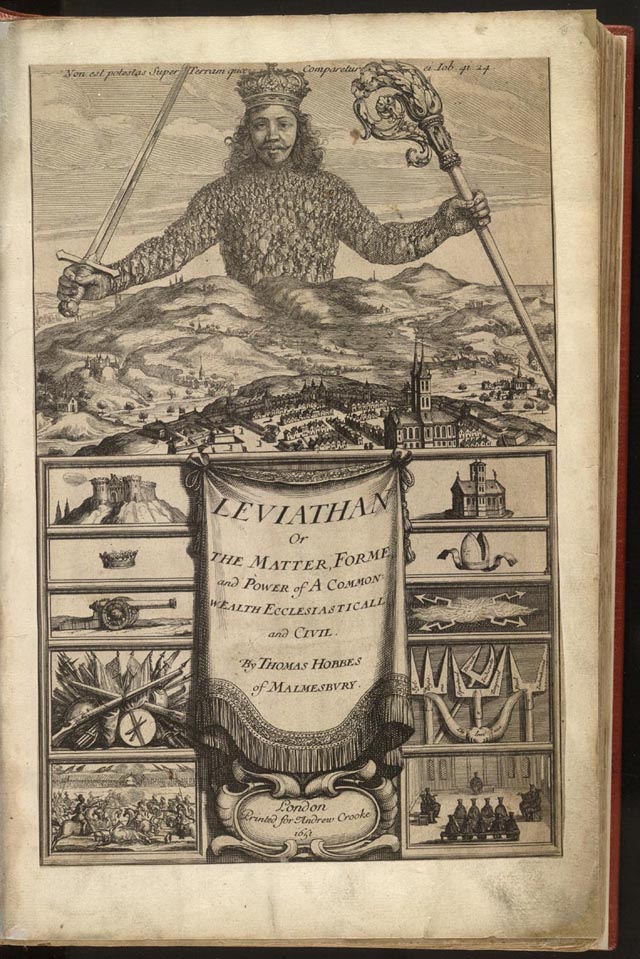
Hobbes argues that the “state of nature” of man is rules of reason contrary to human instincts. These laws of nature must be enforced by some coercive power, if justice and harmony are to be attained in society, i.e. by the sovereign.
The sovereign represents an absolute power and unlimited authority whose purpose is to protect the people’s rights, preserve peace and take any action that is necessary to preserve the security of the commonwealth. Thus, the purpose of establishing a commonwealth is to protect the rights of all individuals, and to prevent a state of conflict or ‘war.’
Since the sovereign establishes the rights of the people, establishes all the rights according to the laws of the commonwealth. Once the covenant is made, the people must unflinchingly obey the sovereign and can no longer sign another covenant with another ruling body nor possess the right to revolution despite an oppressive sovereign.
However, Hobbes also claims that we can indeed “disobey the sovereign” only and only if the sovereign fails to protect people’s lives. This exception of the theory, however, is evidently conflicted with Hobbes’ theory of rightful overthrow of the sovereign.
In order to understand why this exception of rule is possibly conflicted, let us examine what the conditions for disobey actually are. Hobbes claims that sovereigns can be disobeyed by a lawful citizen of the state finds that their chosen sovereign can no longer protect them. By “protect” I mean protection from the state of war. This is critical to Hobbes’ theory because of his claim of sovereign’s duty because the sovereign’s function is national security.
Note, Hobbes’ priority is collective security rather than individual mortal peril which suggests that if the state happens to incur collateral damage in the protection of the state, it would be justified. It also suggests that Hobbes would be okay if a dictator is oppressive to certain people over others. None but those who are banished, prisoners of war can oppose or question the sovereign because he is fulfilling the duty of preservation of peace and civilization. If this basic duty is unmet, then the people may “disobey”, as Hobbes describes.
Therefore I contest that Hobbes’ aforementioned conditions do not make room in his theory of sovereign overthrow. However, disobeying the sovereign could mean a variety of action steps. If “disobey” indicates going against the sovereign’s rules then the mentioned exception would not be compatible with the theory because Hobbes considers the sovereign not-punishable. By virtue of the sovereign’s establishment that there are no rights of people to revolt, “disobeying” will not be possible.
Moreover, the sovereign may be responsible for other kinds of threats to national security other than just war such as famine, dire poverty etc. It is unclear whether Hobbes would consider life-threats less immediate than war to qualify for reason to overthrow the sovereign. I contest that Hobbes would not qualify these as reasons to overthrow the government because they are not as immediately life-threatening as war, which is why Hobbes qualified war.
However contrary to my arguments, many may contest that the conditions for the overthrow of the sovereign are compatible with that of the theory of rightful way of sovereign overthrowing. For instance, if the theory includes any condition of national security then it would be fitting the theory.
War is indeed the most immediate and comprehensive model of the threat to the people’s lives, but conditions like famine and dire poverty too are threatening to survival i.e. the most important condition for Hobbes. This condition too must use the definition of “disobey” as the overthrow of the sovereign rather than the disobedience of laws laid down by the sovereign.
This is because disobedience of laws is an insufficient method of establishing that the sovereign has failed to fulfill its basic duty. However, this argument limited by the fact that sovereignty i.e. the political structure the state is operating in may degenerate into anarchy, tyranny, and oppression which may or may not necessarily be life-threatening but contrary to what the people of the state desired from their chosen sovereign. It is unclear whether the privilege of disobedience of the sovereign because of a threat to life rather than an obvious threat such as during the war.
